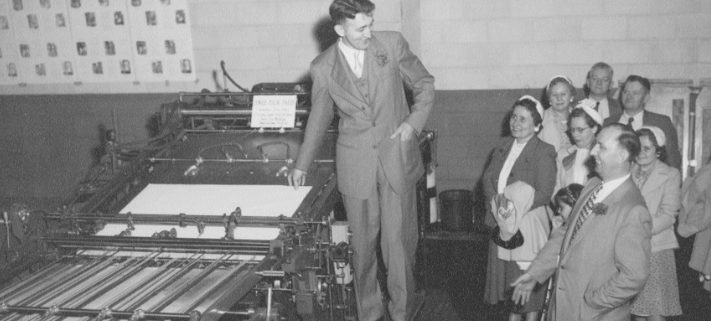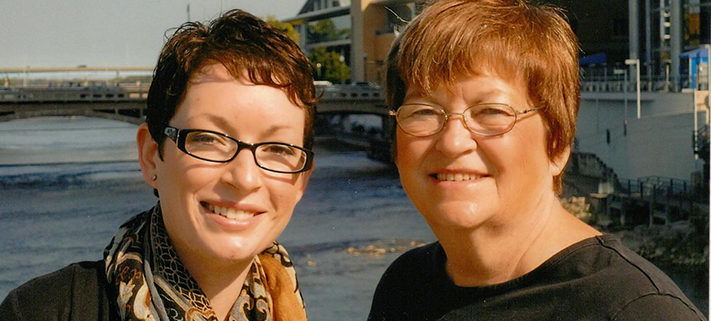It’s a label many of us wear with pride: “Christian parent.” What does it mean, though? How does a Christian mom or dad parent differently than a non-Christian one? Our authors this month give us some examples from their lives, which may help us as we continue on our Christian parenting journeys.
Have you checked out Heart to heart’s blog site lately? In addition to each month’s articles, monthly webcasts and podcasts are also available. Visit forwardinchrist.net today.
Nicole Balza
How does Christianity affect my parenting? How does it not? Maybe there’s a bigger question for me, though. Maybe the question is: How does looking like a Christian parent hinder my parenting?
If you have been a lifelong Christian like me, you may have a mental picture of what good, Christian parents look like. I did.
My picture: They are married. They have respectful and well-behaved kids. If they have to discipline, they do it with love and logic. They send their kids to the Lutheran elementary school. Their children are active members of the youth groups—not only for themselves but also for the example they set for the other youth. You could probably put a few more thoughts in there. I could too.
If you look at my list, it paints a pretty picture. My husband and I worked hard at painting it. It’s not a bad painting. However, striving for this painting started to overshadow real Christian parenting.
What did we look like to the other families of our congregation? What kind of example were we to our neighbors? These questions aren’t bad questions, but they became more important than questions like: Are we loving God? Are we loving others? Are we modeling those things to our children?
Stripping away our concerns of how we think others view our parenting gives us freedom to live under God’s grace. We find that focusing on our own relationship with Christ compels us to love others and therefore model that to our children. Sound familiar? “Seek first his kingdom and his righteousness, and all these things will be given to you as well” (Matthew 6:33).
My husband, Tad, and I have since made choices that may not look like what good, Christian parents would do. For example, we just finished our sixth year of homeschooling even though we have a wonderful Lutheran elementary school. We take very seriously the command to “bring them up in the training and instruction of the Lord” (Ephesians 6:4). Our choices are prayerfully deliberated with this as our goal. Because Tad accepted a call to be “The Youth Guy,” he is gone nights, weekends, and chunks of summers. Fridays are his day off, which is when the kids were in school. How can Tad be a part of “bringing them up” if he isn’t home when they are? We realized how much impact we could have if our kids were home with us.
Finally, I learned to be careful of my opinions when others painted a different picture of good, Christian parenting. Just because it doesn’t look like my painting doesn’t mean it’s wrong or even not as good as mine. I know some people questioned our decision to homeschool. I appreciated the people who asked me about our decision process or why we chose what we did. Those people sought understanding.
Seek God first. Bring your children up in the training of the Lord. Let’s encourage parents, as our picture is always changing.
Jenni Schubring and her husband, Tad, have three sons and a daughter.
It was Friday night. My wife was at an event for church, and my daughter was at a sleepover at a friend’s house. My son and I had a night off together. We decided to go to a movie and looked at the options. There was one superhero-type movie that I thought looked good. My son thought it looked “awesome!” Then I saw the rating: “R.”
My son asked, “Dad, why can’t we go to an R-movie?”
That question reminded me of this Heart to heart topic. Is there a difference in how a Christian versus a non-Christian parent might respond to my son’s question? Couldn’t we both reply by pointing out that the movie has sexual contact, vulgar language, and extreme violence and that’s inappropriate for young children? I think we could—and that was part of my response.
We all have non-Christian friends who do a great job of instilling basic morals and values in their children. After all, everyone has a natural knowledge of God’s law and can use that in their parenting as they train their children not to hurt others (or watch others do so in a movie), steal, lie, etc.
But as a Christian parent, we have something more! We not only have God’s law, but we also have the gospel. We know that there is no way we can keep the law perfectly, but Christ did for us—and gave his life to pay the penalty for our sin. By God’s grace, we are forgiven and heirs of eternal life. Everything we do now is not merely motivated by God’s law. The law has been fulfilled by Christ’s sacrifice. Now what we do comes out of joyful response to the gospel message.
“Dad, why can’t we go to an R-movie?”
We can! But, let’s think about how we can show our love to God? By watching a movie filled with sexual contact, vulgar language, and extreme violence? Or by staying home with a bowl of popcorn and watching Star Wars? We chose Star Wars—and I ate most of the popcorn.
These teachable moments of gospel opportunity are always before us. Let’s admit that we likely err on the side of being more law-based than gospel-based in our parenting. It’s natural, but it’s truly at the root of what sets us apart as Christian parents. Remind yourself of your overwhelming thankfulness that despite your sin and imperfections, the Holy Spirit has led you to know Christ’s love. Now it’s our opportunity to demonstrate that thankfulness in the lives of our children.
Dan Nommensen and his wife, Kelly, have a daughter and a son.
It’s been said that we get our view of God from our relationship with our earthly father. If that’s true, then we parents, and especially fathers, want to do the best we can to give an accurate view of God the Father. We want to parent our children the way that God parents us.
Here are some observations I’ve made about the way God parents me and some things I’ve done as I try to father my sons the way God has fathered me.
• God takes his law seriously. He makes that clear by allowing and even sending consequences into my life. Likewise, as a loving father, I will allow and give my boys consequences for their sinful actions when they rebel against God and me. These consequences are given in love, not anger, and are meant to teach my boys that God’s way is always best.
• But, even as I suffer the consequences of my sin, God regularly assures me of his unconditional love based on Jesus’ work in my place. I am forgiven. I am always his dearly loved child. Likewise, I want my boys to know that my love for them is unconditional. I always try to be quick to assure them of my forgiveness and of God’s. In our house we don’t answer, “I’m sorry,” with “It’s okay.” It’s not okay. It’s a sin. Instead we say, “I forgive you, and so does God.” We live confession and absolution on a daily basis.
• God makes it clear that he’s not too busy running the universe to make time for me and to listen to my prayers. Likewise, I want to show my boys that I’m not too busy for them. To get to know my boys’ hopes and dreams, worries and fears better, I’ve been occasionally taking each one out for breakfast—just the two of us. They promise to answer my questions honestly. I promise to try not to embarrass them.
Role models have an important place in the lives of those who are seeking to grow. But it’s not just children who need role models; parents need them too! And what better model can we find as we seek to grow as parents than our heavenly Father who parents us perfectly? So we study his Word to know him better, to be assured of his forgiveness for our failures to be like him, and to find the gospel motivation to mimic him more closely. Just as God loves me and parents me, so I want to love my children and parent them. We want to “follow God’s example, therefore, as dearly loved children” (Ephesians 5:1).
Rob Guenther and his wife, Becky, have four sons ages 11 and under.
Do you have a manuscript, idea, or story from your own life you’d like to share for use in Forward in Christ or on wels.net? Use our online form to share it to our editorial office for consideration.
Get inspirational stories, spiritual help, and synod news from Forward in Christ every month. Print and digital subscriptions are available from Northwestern Publishing House.
Author: Nicole Balza
Volume 103, Number 8
Issue: August 2016
Copyrighted by WELS Forward in Christ © 2021
Forward in Christ grants permission for any original article (not a reprint) to be printed for use in a WELS church, school, or organization, provided that it is distributed free and indicate Forward in Christ as the source. Images may not be reproduced except in the context of its article. Contact us






